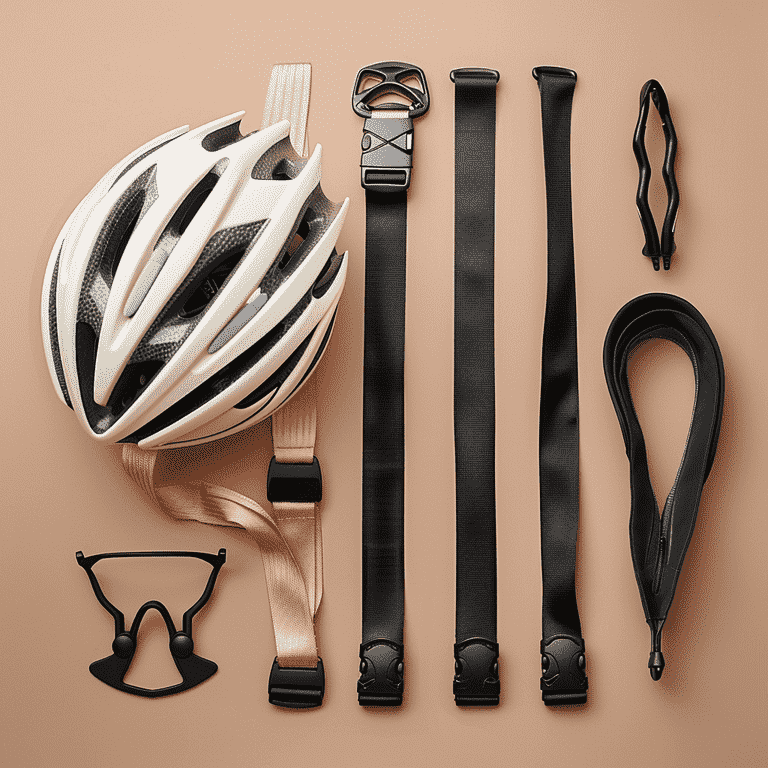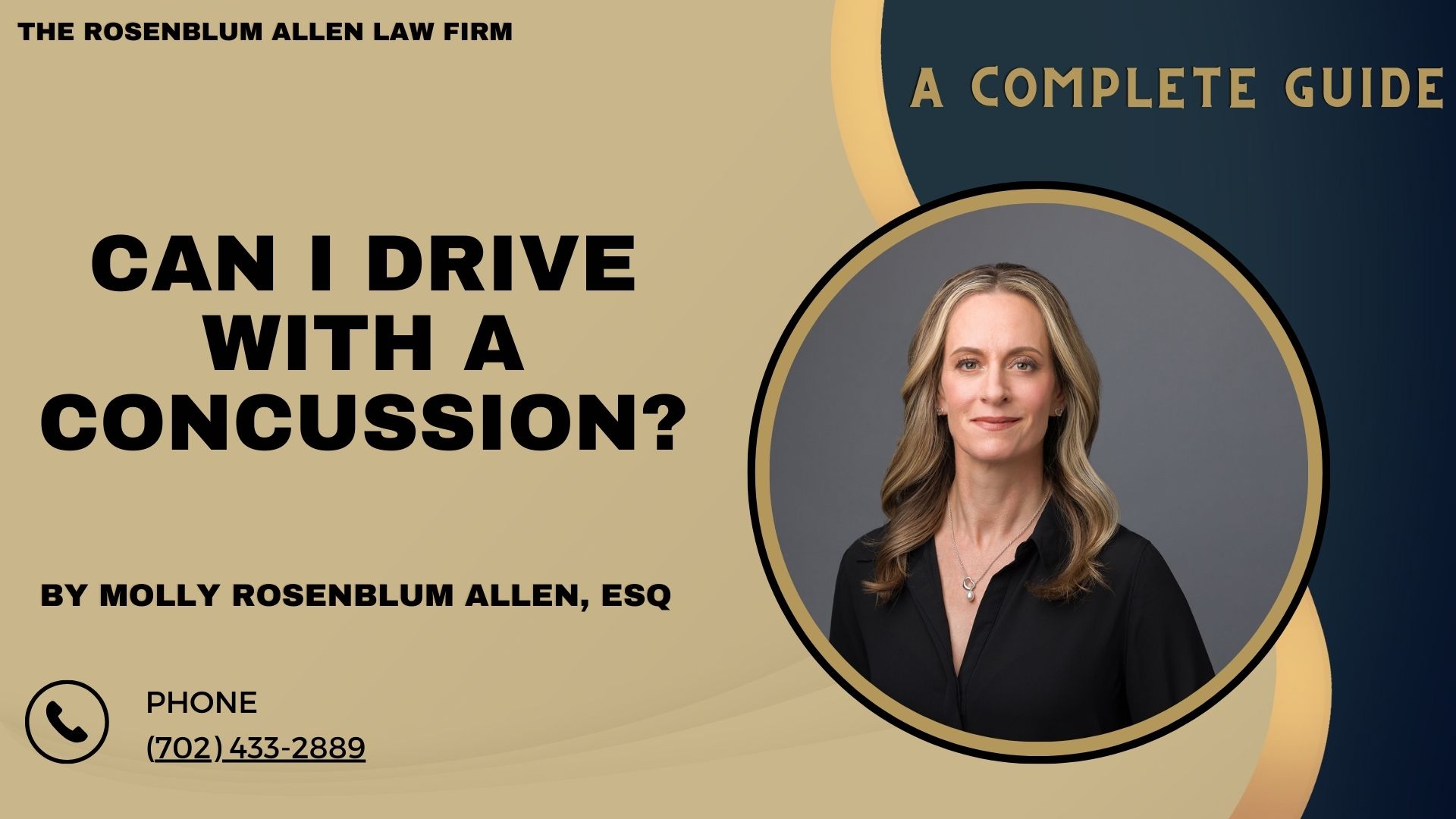Driving requires full attention and quick reflexes. However, after a concussion, these abilities can be significantly impaired. This article answers if you can drive with a concussion in Las Vegas. It focuses on safety and the law.
 Understanding Concussions
Understanding Concussions
A concussion is a type of traumatic brain injury caused by a bump, blow, or jolt to the head. Symptoms can include headaches, dizziness, confusion, and blurred vision. Recognizing these signs is crucial for your safety and the safety of others on the road.
Symptoms to Watch For
Headache or a feeling of pressure in the head
Temporary loss of consciousness
Confusion or feeling as if in a fog
Dizziness or “seeing stars.”
Ringing in the ears
Nausea or vomiting
Slurred speech
Fatigue
Immediate Actions Post-Injury
Seek medical attention: Always get checked by a healthcare professional after a head injury, even if symptoms seem mild.
Rest: Give your brain time to heal by taking a break from physical and cognitive activities.
Monitor symptoms: Keep track of how you feel in the days following the injury.

Legal and Safety Considerations
In Las Vegas, as in many places, there are no specific laws that forbid driving after a concussion. But, driving while impaired means by alcohol, drugs, or a medical condition. It can lead to legal trouble. A concussion could impair your driving ability, putting you and others at risk.
Risks of Driving with a Concussion
Slowed reaction times
Difficulty concentrating
Impaired judgment
Blurred or double vision
Sensitivity to light
Legal Implications
Driving with a known impairment, like from a concussion, could be negligence. One could also perceive it as acting recklessly. If an accident occurs, you could be liable for any damages or injuries caused.
This first look at the topic shows that safety is more important than convenience. Before deciding to drive after a concussion, think about the risks. Also, think about the legal consequences. Your well-being and that of others on the road should always come first.

When to Wait Before Driving
This section will focus on guidelines for how long someone should wait before getting behind the wheel after experiencing a concussion. It would emphasize listening to healthcare professionals’ advice and recognizing personal limits.
Guidelines from Health Professionals
General advice on recovery times
Importance of following personalized medical advice
Signs You’re Not Ready to Drive
Persistent symptoms (e.g., dizziness, blurred vision)
Difficulty concentrating for extended periods
Needing more time to make decisions or solve problems

Alternative Transportation Options
Safety is a priority. This part would offer tips for getting around without driving. It would stress that this situation is temporary.
Public Transport
Availability and tips for using Las Vegas’s public transportation safely
Rideshare and Taxis
How to use rideshare apps and taxis, including tips for a comfortable, safe ride
Help from Friends and Family
Coordinating rides and the benefits of relying on a support network during recovery

Preventing Future Concussions
This section focuses on prevention. It would provide tips to reduce the risk of future concussions. These tips reinforce the importance of caring for one’s health.
Safety Measures
Wearing seatbelts properly
Using helmets for appropriate activities
Making homes safer to prevent falls

Breaking It All Down
In conclusion, deciding to drive after a concussion requires careful consideration. You must consider both legal and health safety. Las Vegas laws do not explicitly forbid driving with a concussion. But, the potential for impaired driving raises big safety and legal concerns. Recognizing the symptoms of a concussion is crucial. Understanding the risks is key for making informed decisions about driving. You must consult with healthcare professionals. They can give personalized advice tailored to your condition. You can use alternative transportation options, like public transit or rideshares. You can also rely on friends and family. These options offer safer routes until you’re cleared to drive. Ultimately, putting your health first. Also, the safety of others on the road is key. Recovering from a concussion is about healing. It is also about making good choices. It’s about allowing time for healing.

Frequently Asked Questions
Can I be fined or arrested for driving with a concussion in Las Vegas?
Yes, driving impaired due to a concussion can result in fines or arrest for reckless driving. The law assesses your fitness to drive regardless of the medical condition causing impairment.
How long after a concussion can I legally drive again?
There’s no set timeframe; it varies by case. The key is being able to drive safely, assessed by a doctor.
Will my car insurance cover accidents if I drive with a concussion?
Coverage depends on your policy and accident details. However, driving impaired, such as by alcohol or medical conditions, might affect coverage.
Is it safe to drive short distances with a concussion?
It’s risky if symptoms impair your driving. Avoid driving until cleared by a healthcare professional.
What should I tell a police officer if I’m stopped while driving with a concussion?
Be honest about your condition, but admitting impairment could lead to consequences like being asked not to drive until evaluated by a doctor.
Can someone else be held liable if they knew I had a concussion and let me drive?
Potentially yes, as they might be considered negligent if aware of your condition and still allowed or encouraged you to drive.
How can I prove I was fit to drive after a concussion if there’s an accident?
Keep documentation from your healthcare provider outlining your recovery and clearance to drive.
Are there any special considerations for professional drivers with a concussion in Las Vegas?
Professional drivers may face stricter rules. They should consult their employer and healthcare provider to understand their duties and limitations.
What if I don’t realize I have a concussion and choose to drive?
Knowing the signs of a concussion is crucial. Driving while impaired, even unknowingly, can lead to legal issues and endanger yourself and others.

Glossary
Concussion: A type of traumatic brain injury that affects your brain function. Effects are usually temporary but can include headaches and problems with concentration, memory, balance, and coordination.
Impaired Driving: Operating a vehicle with alcohol, drugs, or a medical condition like a concussion diminishes your ability to do so. This can lead to decreased reaction times, poor judgment, and accidents.
Reckless Driving: A severe traffic violation occurs when a driver operates a vehicle in a manner that shows an utter disregard for the safety of others.
Symptoms: The physical or mental features that indicate a condition or disease. In the context of concussions, symptoms can include headaches, dizziness, confusion, and blurred vision.
Negligent: Failing to take proper care when doing something. Driving with a known impairment, such as a concussion, and causing an accident can be considered negligent behavior.
Liability: Being responsible, especially by law, for the consequences of specific actions. In driving with a concussion, if you cause an accident, you could be held liable for any damages or injuries.
Healthcare Professional: A person who provides preventive, curative, promotional, or rehabilitative health care services systematically to individuals, families, or communities.
Reaction Times: How long it takes to respond to a stimulus. Concussions can slow reaction times, making it dangerous to drive.
Judgment: The ability to make considered decisions or come to sensible conclusions. A concussion can impair judgment, affecting driving decisions.
Sensitivity to Light: An intolerance to light, including sunlight or artificial light, can cause discomfort or the need to squint or close one’s eyes. This is a common symptom following a concussion.
Rideshare Apps: Mobile applications that connect passengers with drivers of vehicles for hire. They offer an alternative to traditional taxi services and are a recommended transportation option for someone recovering from a concussion.
Recovery Time: The period required to recover from an injury or illness. This varies greatly among individuals and specific conditions like concussions.

Additional Resources for You
As we conclude, it’s vital to remind our readers that our lead attorney, Molly Rosenblum Allen, Esq., has diligently created a suite of resources to assist you in your time of need. Understanding the challenges you face, we offer comprehensive support across various legal areas. Below are valuable resources that Molly Rosenblum Allen, Esq., has developed for those seeking legal assistance:
Las Vegas Personal Injury Attorney: For individuals who have suffered injuries due to someone else’s negligence. Find out more.
Las Vegas Car Accident Attorney: Specialized support for victims of car accidents, helping navigate the complexities of insurance and compensation claims. Learn more.
Motorcycle Accident Lawyer Las Vegas: Dedicated legal assistance for motorcycle riders involved in accidents, ensuring their rights are protected. Explore your options.
Wrongful Death Lawyer Las Vegas: Compassionate representation for families seeking justice for the loss of a loved one due to wrongful death. Discover how we can help.
Truck Accident Attorney Las Vegas: Expertise in handling cases involving truck accidents, focusing on the unique challenges these incidents present. Get informed.
Las Vegas Drunk Driving Accident Attorney: Assistance for victims of drunk driving accidents, helping to secure fair compensation for their injuries and losses. Read more.
Las Vegas Slip and Fall Attorney: Support for those injured in slip and fall accidents, navigating premises liability to achieve justice. Learn about your rights.
Each of these resources has been created with your best interests in mind, aiming to provide the legal guidance and support you need during challenging times. Our commitment to your well-being and justice remains unwavering. Should you or a loved one require legal assistance, do not hesitate to reach out to us.

Outside Resources for You
National Highway Traffic Safety Administration (NHTSA): Offers extensive resources on road safety, including measures to prevent accidents and injuries. Visit NHTSA.
Brain Injury Association of America (BIAA): A leading organization dedicated to advancing brain injury prevention, research, treatment, and education. Visit BIAA.
American Bar Association (ABA): Provides general legal resources, including information on finding legal services and understanding your rights. Visit ABA.
Safe Kids Worldwide: Focused on preventing injuries in children, this organization provides resources for parents to ensure the safety of their kids on the road. Visit Safe Kids Worldwide.
United States Department of Transportation (USDOT): Offers insights into transportation safety and regulations, which can be beneficial for understanding the broader context of road safety. Visit USDOT.
American Association for Justice (AAJ): Provides resources for those seeking justice in personal injury and other legal matters, emphasizing the importance of a fair legal system. Visit AAJ.

A Special Message from Our Lead Attorney, Molly Rosenblum Allen, Esq

Thank you for exploring the resources we’ve made to help you navigate your legal concerns. Your well-being and obtaining the justice you deserve are paramount to us.
I’m our lead attorney. I’ve dedicated myself to providing top-notch legal help. I also ensure that you have access to thorough information. It empowers you in these tough times. We know the complexity of legal issues. We strive to offer clarity and support through every step of your journey.
If you need more help or are ready to take the next steps, please call me and my team at (702) 433-2889. We can discuss the best course of action and how we can support you moving forward.
Sincerely,
Molly Rosenblum Allen, Esq.





